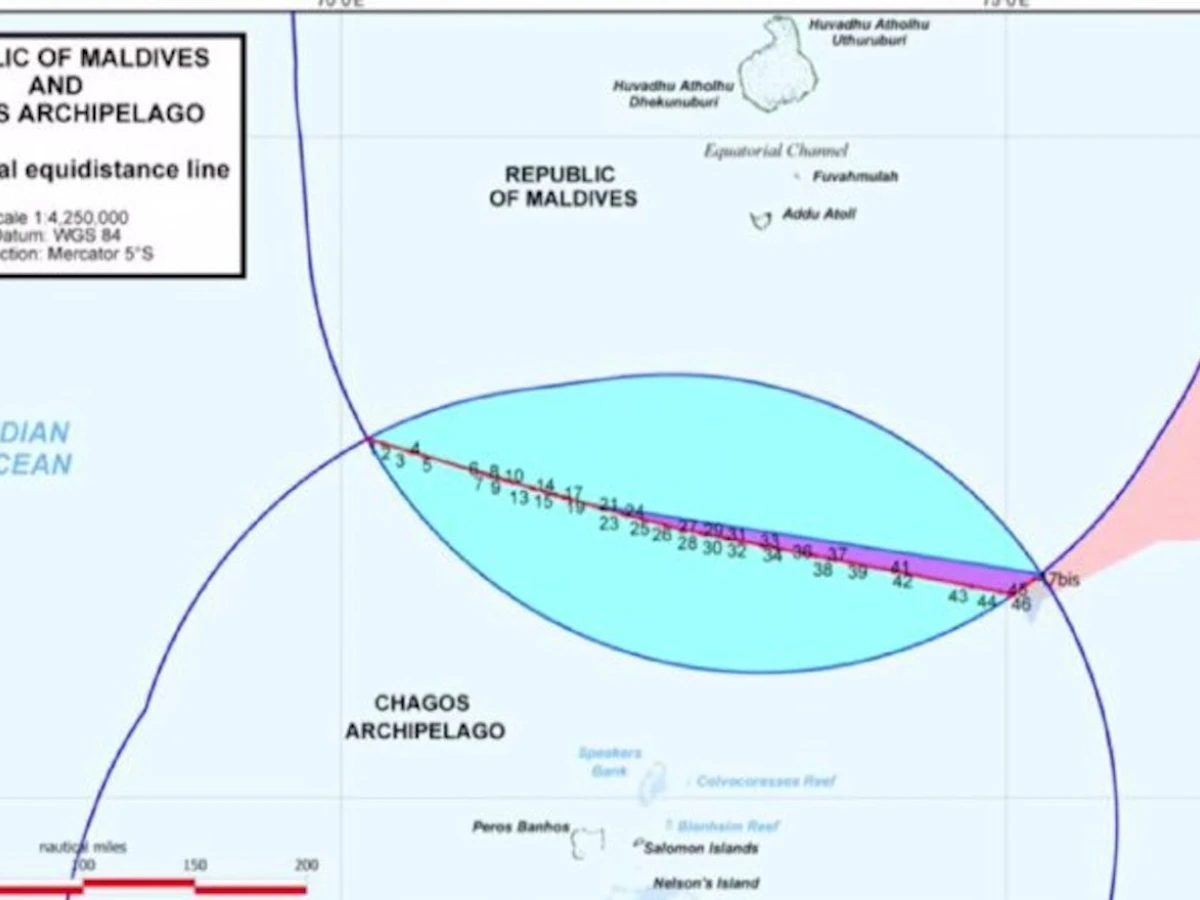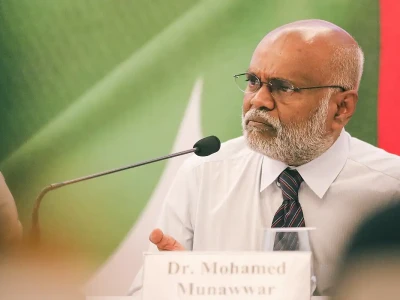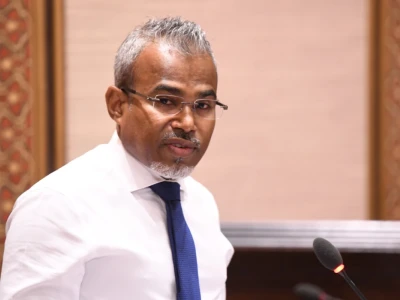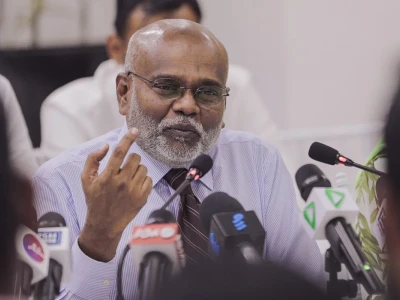
Ex-AGs: Govt didn't try to get largest possible area for Maldives in Chagos dispute
Therefore, the attorney generals stated that it does not seem reasonable that the government would, at a time like this, change their stance.
Top Stories
-
MP Mauroof released from custody, receiving hospital treatment
-
House floor sinks in Malé during nearby construction work
-
PNF to hold special rally at Artificial Beach on Wednesday
-
MDP MP says Mauroof arrest may breach parliamentary privileges
-
Complaint filed with JSC over judge’s remarks on defence lawyer
By
Aminath Shifleen
Two former attorney generals on Wednesday expressed concern over what they called the government's failure to acquire the largest area available to the Maldives, along with the concern for the government's decision to recognise the Chagos islands in the south of Addu city as Mauritius territory.
Mauritius approached the International Tribunal for the Law of the Seas (ITLOS) and in the hearing last week at Hamburg, Germany, the incumbent Maldivian Attorney General Ibrahim Riffath announced that the Maldives would vote in favour of Mauritius at the UN, saying that Maldives has changed its stand on the Chagos dispute.
While the government has assured that the decision will not affect the issue of Maldives-Mauritius maritime demarcation, some have expressed concern that this change in policy will force the country to forgo a part of its Exclusive Economic Zone (EEZ).
At a time when politicians and experts are criticising this heated issue, two former attorney generals Fathimath Diyana Saeed and Azima Shakoor issued a joint statement on Wednesday. In the six-page statement, they spoke at length about the case and work done in the tribunal.
According to the statement, Mauritius had filed a lawsuit in ITLOS regarding the distribution of the area, and according to the ongoing case, there is a difference of opinion as to which base points are being identified by the Chagos islands to determine the special economic zone they claim to belong to them.
-
Mauritius says base points will be marked at Bleinhem Reef, which Maldives denies
-
According to the Maldives, these base points should be located in the interior of Chagos rather than Bleinhem Reef
-
A total of 18 places are marked in the atoll known as Peros Banhos and the Saloman Islands
"The Maldives' stand has changed, and our concern is with the way Maldives proposes to divide the disputed portion between the claim areas of the Maldives by removing the area claimed to be the exclusive economic zone of Chagos islands from the base point presented by the Maldives," the statement said.
"It is clear from the findings of the Counter Memorial submitted by the Maldives to the UN tribunal that the Maldives would agree to the division of the area on the basis of the ‘equidistance’, and this is what the state has been objecting to."
Diyana, who was the first attorney general under former president Mohamed Nasheed, and Azima, who served as attorney general under former president Abdulla Yameen Abdul Gayoom, said the current methodology for demarcation of the area is divided in three stages.
-
1-
Drawing a temporary line in the middle of the disputed area
-
2-
Depending on the circumstances, to see if any change to the temporary line is required
-
3-
To see if there are unfair conclusions based on the temporary line
Despite this, the statement said that the government had not made any efforts in the second and third phases of the hearings to acquire the 200 nautical miles of sea territory that Maldives objected to losing in the beginning of the first phase of partition, which is part of the Exclusive Economic Zone (EEZ) of the Maldives.
The statement said that even if the 200 nautical miles of EEZ may not be attained completely, which the state has been advocating for a long time and for which the state was obliged, the government had not made any attempts to move the area beyond the middle line to try and get as large an area for the country as possible.
ITLOS concluded that Mauritius would be considered as the country to be investigated in a case related to the delimitation of the EEZ near Chagos, even if Mauritius was not completely decolonised.
The statement said that Maldives having to change its stance today is owed to the fact that the government had not pressed on in advocating for the extension of the temporary boundary from the middle of the disputed area, even when it was justified.
"In view of this, we are deeply concerned about the possible loss of territory that was likely to be acquired by the Maldives," the attorney generals said in their statement.
In the joint statement, the former attorney generals even underlined possible just causes that were in favour of Maldives:
-
The Maldives is home to a race and population unlike the islands of Chagos, and the sea has long been used as a source of the country’s income
-
On the other hand, Chagos is not populous, and a part of it has been used exclusively for long-term military purposes, and the division of the area on the basis of ‘equidistance’ would not be fair, as per the international convention on maritime law
-
Even so, it is incumbent on the government to claim and defend the economic area available to the Maldives at the largest possible scale
Senior advocate Prof Payan Akawan, representing Maldives in the case, said that the Maldives has lost the opportunity to claim the Chagos islands area after the International Court of Justice (ICJ) recommended that the islands fall under the sovereignty of Mauritius.
However, the attorney general's statement said that while the ICJ's prior advice on the ownership of Chagos was legally backed, it was not legally binding.
Therefore, the attorney generals stated that it does not seem reasonable that the government would, at a time like this, change their stance that Mauritius has the sovereignty over the Chagos islands.




